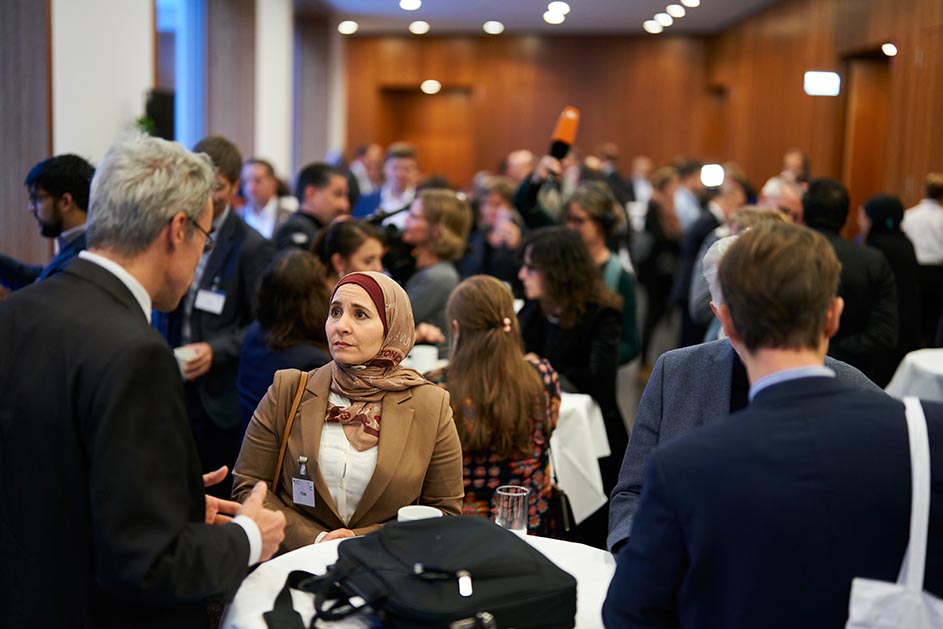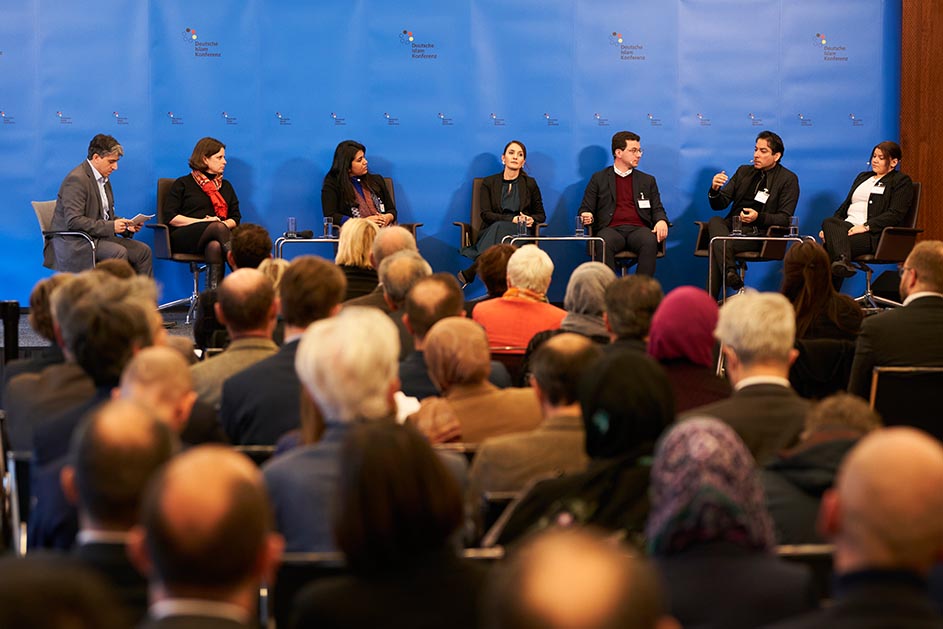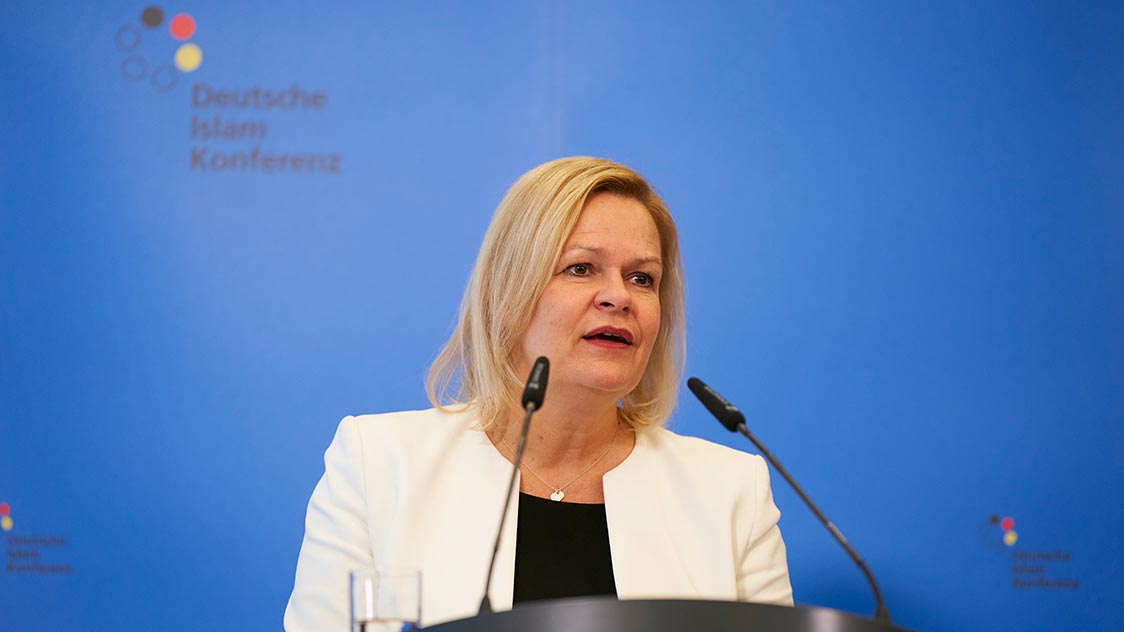"Driving the discussion of policy issues related to Islam" , , German Islam Conference (DIK) officially relaunched in Berlin
"Talking to each other rather than about each other."
A new phase of the German Islam Conference (DIK) was officially launched on 7 December. Federal Minister of the Interior Nancy Faeser opened the kick-off event at the Federal Ministry of the Interior and Community (BMI) in Berlin. It was attended by some 160 people representing Germany’s diverse Muslim community, federal ministries, federal states, municipalities, Christian churches, the Jewish community, the academic community and other areas of society.
"The Islam Conference has become the main forum for dialogue and cooperation between the government and the Muslim community in Germany,"
Minister Faeser said regarding the importance of the conference. She added that the conference had a strong foundation to build on and that it had already "made a truly vital contribution to Muslim participation in our society"
during previous electoral terms, for example by introducing Islamic religious instruction in public schools, by establishing Islamic theology departments at universities and by promoting the participation of Muslims in societal debates.
Advancing the participation and integration of Muslims
According to Minister Faeser, the focus of the current phase of the Islam Conference was on preventing and combating anti-Muslim hostility, continuing to improve the participation of Muslims and Muslim communities in society, strengthening imam training in Germany as an alternative to bringing in imams from abroad, and expanding chaplaincy services for Muslims, for example in the Bundeswehr.
 Source: Henning Schacht
Source: Henning Schacht
The Minister pointed out that the conference should "reflect the broad range of Muslim life, provide fresh impetus on substantive matters, drive the discussion of policy issues related to Islam, and foster dialogue within the Muslim community."
In addition, she explained: "Muslims in Germany and their religion are of course an integral part of our society, and the state addresses their concerns."
Faeser said that she wanted Muslim engagement to become "more visible" and Muslim communities to become "more strongly rooted in society". At the same time, she made clear that it is also necessary to critically address issues such as antisemitism among Muslims and, more generally, intolerance in the Muslim community towards other groups in society. At the end of her keynote speech, Minister Faeser addressed the Muslim community: "Please help shape, enliven and strengthen cohesion in Germany and Europe!"
Providing a home, offering training and preparing for the future
Following Minister Faeser’s speech, the issues she mentioned and other topics were addressed in greater detail in two panel discussions involving the audience. The first panel discussion was titled "Social cohesion in times of change and crisis – What role does the Muslim community play?"
Moderated by Dr Hussein Hamdan (head of the department "Muslims in Germany – Shaping society together" at the Academy of the Diocese Rottenburg-Stuttgart), the panel discussion featured:
Juliane Seifert (State Secretary at the BMI), Saba-Nur Cheema (member of the independent expert group on anti-Muslim intolerance and hate appointed by the BMI), Eyüp Kalyon (spokesperson of the Coordination Council of Muslims in Germany (KRM) and coordinator of imam training courses offered by the Turkish-Islamic Union for Religious Affairs (DITIB)), Prof. Mouhanad Khorchide (Head of the Center for Islamic Theology at the University of Münster), Gonca Türkeli-Dehnert (State Secretary at the Ministry of Culture and Science of the federal state of North Rhine-Westphalia), and Odette Yilmaz (first chairperson of the Liberal Islamic Federation e.V. (LIB)).
 Source: Henning Schacht
Source: Henning Schacht
The panel discussion mainly focused on forms of and experience with anti-Muslin hostility and on ways to address and prevent it. Saba-Nur Cheema spoke about the work of the independent expert group on anti-Muslim intolerance and hate, which was appointed by the BMI and will present a comprehensive report with recommendations for action in summer 2023.
Another topic for discussion was providing a home for Muslim communities in Germany. This part of the discussion addressed the meaning of "home" in an immigrant society, what role the idea of "home" plays for people with an immigrant background and for different generations, and how this relates to Islam as practised in Germany. In addition, the participants discussed the topic of imam training, what role imams who have been socialised and trained in Germany play for mosque congregations and what role they could and should play in the future.
Becoming visible as an "integral part of the neighbourhood"
The second panel discussion focused on "Muslim engagement in society and government – challenges, stakeholders and impetus", and included the following participants: Jörn Thießen (Head of the Directorate-General for Community, Cohesion and Society at the BMI), Taner Beklen (national chair of the German Association for Young Muslims), Ibrahim Emre (board member of the Alevi Federation Germany (AABF)), Dr Tagrid Yousef (Head of the Social Affairs Department and Second Deputy Mayor of the city of Dinslaken), and Dr Özgür Özvatan (Berlin Institute for Empirical Integration and Migration Research (BIM) at the Humboldt-Universität zu Berlin).
The group discussed possible ways to reach the goal Minister Faeser had mentioned in her opening speech – for mosque congregations to "become visible (...) as an integral part of the neighbourhood" and be "recognised as stakeholders in society". Additional topics included the changing roles of Muslim women and their organisations in particular as well as issues related to political participation, youth work and chaplaincy.


